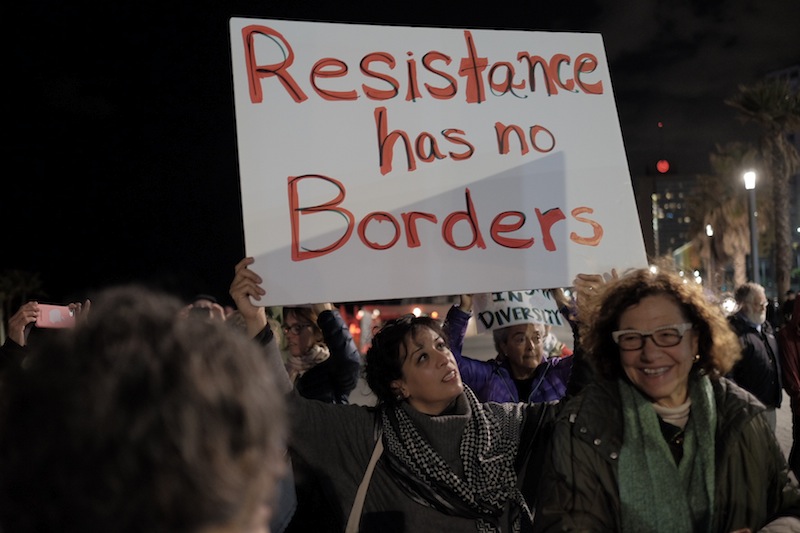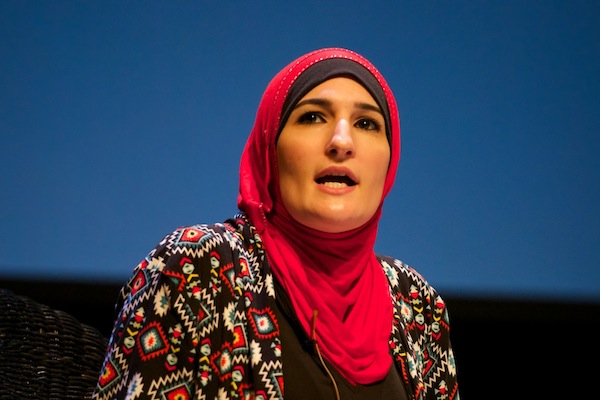The question is whether Zionism can make room for a truly inclusive equality.

In a recent New York Times op-ed “Does Feminism have Room for Zionists?” Emily Shire, who identifies as a feminist and a Zionist, argues that her belief in “Israel’s right to exist as a Jewish state” should not be at odds with her feminism.
According to Shire, women who seek to be included in the women’s protests against the current U.S. administration should not have to face a “critical of Israel” litmus test. She takes issue with the Strike’s platform, which specifically calls for the “decolonization of Palestine,” but which doesn’t mention the myriad other injustices inflicted on women across the world.
But Shire herself brings up her own Zionism. She states her relationship to Israel shouldn’t be a factor for the women’s protest, while simultaneously demanding a space for it — Zionism being a giant, pertinent caveat. In doing so, Shire is ironically subjecting women active in the movement to her own litmus test.
Shire is asking the wrong question. It is not whether feminism has room for Zionists, but whether Zionism has room for equal rights. Zionism’s manifestation as a political system operating for almost 69 years now has thus far proven it does not have that room. The State of Israel was founded as a safe haven for Jews and is premised on privileging Jews over all others. It is not a country for all its citizens — over 20 percent of whom are not Jewish at all — but for all Jewish people (and increasingly, only certain kinds of Jews to boot).
Shire gives the impression that she hasn’t sat down to consider how Palestinian women’s rights, in Israel and in the occupied territories, are systematically affected by Israel’s very raison d’être. (The fact that they are also trampled within Palestinian society does not absolve Israel of responsibility). Instead she insists on Israel’s “right to exist as a Jewish state.” But if one does not define what that should mean for Palestinians, one is evading the core issue. So far, it has de facto meant Israel has had the right to exist as a system of supremacy of one group over another.

I also support the right of Jews to self-determination. But as a Jewish ethno-nationalist state, Israel cannot uphold equal rights. That is a fact. So the question then, is, can a Jewish state exist that doesn’t systematically violate basic human rights?
I‘m not sure. With the right intentions, probably. It’s a worthy and challenging question — one that American and Israeli Jews were grappling with to an extent during the period surrounding Israel’s establishment. What should a Jewish state look like? How can it function as a democracy?
This is an important debate about nationalism and civic democracy, but it is primarily an intra-Jewish issue and has nothing to do with the current wave of feminism in the U.S. It is not the job of Palestinian-American feminist Linda Sarsour to make Zionist women feel more comfortable about the contradictions they are facing. If anything, considering Israel’s track record, it is up to Zionist women to take efforts to assure non-Zionist feminists of their commitment to equal rights.
All forms of violence and oppression against women should be opposed. The International Women’s Strike platform could have mentioned all forms of oppression against women — not just Israel; that only Israel was mentioned is part of the zeitgeist. It cannot be seen in isolation from the context in which Israel oversees the longest-standing military occupation in modern history, while simultaneously being the largest beneficiary of U.S. foreign aid, acting with near total impunity — and with no end in sight.

As an Israeli Jew who actively opposes Israel’s system of rule and supports Palestinian human rights, I may not agree with every tactic employed by the Palestinian resistance movement. But who am I to tell them how to resist their own oppression? As Linda Sarsour said in her interview in The Nation responding to Shire’s piece – “feminism is a movement and BDS is a tactic.” If you don’t support BDS, you can choose to not take part in it, but proactively opposing BDS because it is an alienating tactic for a Zionist is misguided.
In the age of Trump, in which the current feminist forces are operating, many liberal American Jews are finding themselves increasingly pushed into a corner, forced to choose between their liberalism and their support for Israel; between the motto “never again” to Jews and never again to anyone.
Jews, of course, have the right to equality, self-determination and dignity, like all other human beings. No one in the feminist movement has denied this. But as long as Israel, in its current construction, continues to be a fundamentally un-progressive entity that is incompatible with equality, Zionists in the feminist camp are going to continue to feel – rightly – uncomfortable.
A longer version of this article first appeared on March 19, 2017 in Haaretz.


